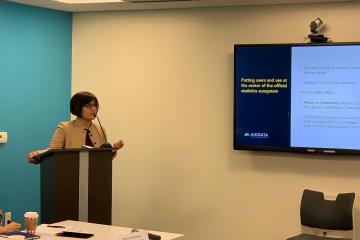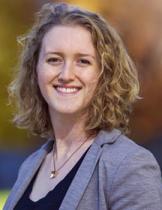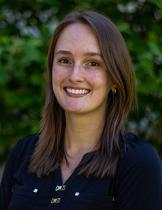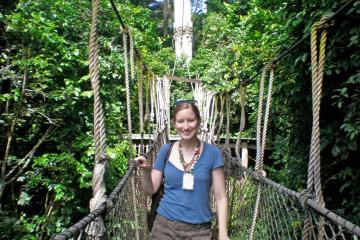
Michael Eddy, J-PAL ‘10, on using evidence to support high-impact organizations
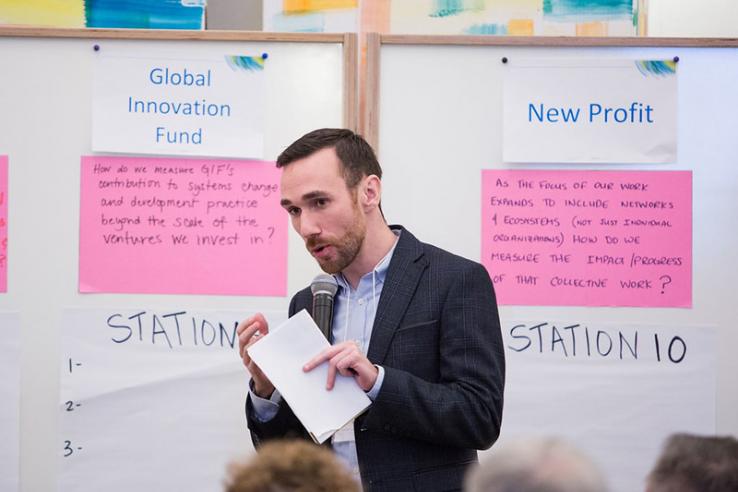
The Alumni Spotlight series highlights J-PAL alumni who are making an impact across industries and around the world. To nominate a J-PAL alum to be featured in a future Alumni Spotlight, please fill out this form.
We caught up with Michael Eddy, formerly of the research teams at J-PAL South Asia and J-PAL Latin America and the Caribbean (LAC). Michael supported several seminal J-PAL health-related evaluations while a research assistant in Udaipur, India, and then traveled to Chile to play a central role in establishing J-PAL’s nascent Latin America office. After an exciting early career in results-based financing and social impact investing, Michael advises major foundations, aid organizations, and social enterprises on evidence use. He reflects on his lessons learned at J-PAL and beyond in this latest Alumni Spotlight.
What first inspired you to build a career in the development and public policy?
I see development as a justice issue—every life has equal value. And yet not every life has equal opportunities. Where I grew up, I didn't have to worry about water being polluted or breathing air that slowly brought on asthma and chronic disease. Higher education was an expectation, not an exception. The lottery of where we were born ought not to determine our outcomes in life. This has shaped my perspective and led me to focus on expanding opportunities for those who otherwise may not have them.
Early on, I was striving for a toolkit to contribute in a concrete way to addressing development challenges. I was an undergraduate around the time when microcredit was receiving a lot of attention. Some people were promoting it as a way to eradicate poverty.
I was working in a refugee camp and NGOs (driven by the donor interest) were offering microcredit to refugees. Yet these refugees lacked secure property rights and access to markets to be able to pay back these loans. Did loans do more harm than good? This inspired me to write my undergraduate thesis on the lack of evidence around microcredit’s effect on poverty and propose solutions for filling the evidence gap in addition to just critiquing it.
You started off at J-PAL South Asia as a research assistant, and then you became a research manager at J-PAL LAC. Could you tell us a bit about these roles?
I joined J-PAL right after college and started working on a number of health and education projects in the city of Udaipur in Rajasthan, India. I was very fortunate to be working under Esther Duflo and Abhijit Banerjee, who were wonderful at helping me to build a rigorous analytical toolkit, while also having the opportunity to get into the weeds on how to run a field operation. I worked on a number of RCTs in India, including the endline surveys associated with the incentives for immunizations evaluation, some teacher and nurse monitoring projects, and an iron fortification project.
After that, I moved to Chile to help set up J-PAL LAC. On my first day on the job, I walked into an empty, furniture-less office at PUC Chile and met Ryan Cooper, the executive director at the time, and Pancho Gallego, who is still a scientific director of J-PAL LAC. I worked with them on introducing J-PAL to Chile and developing our Executive Education course for policymakers and academics, and also on the smaller, yet important, things like building an onboarding manual for research assistants. It was an honor to be part of that journey and to work with those phenomenal people. I’m so excited to see how far the J-PAL LAC team has come since those early days.
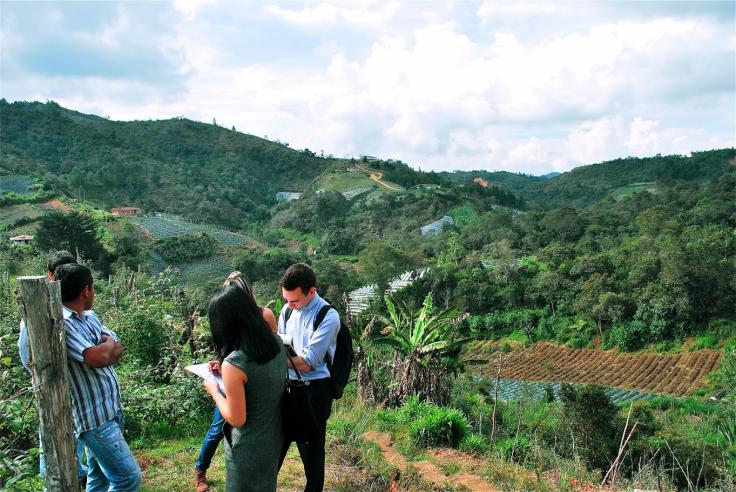
Much of your career has focused around results-based financing and investing for social impact, leading you to co-found Instiglio. What drew you to these areas of work?
When I was in graduate school, I grew increasingly frustrated by this huge gap between the evidence base and what was actually being implemented in policy. For example, the immunization evaluation in Udaipur I mentioned earlier showed that very small incentives can have an outsized impact on immunization rates. And yet, despite the fact that over 10 million children a year miss out on life-saving vaccines, evidence was barely being used outside of research contexts.
While we generate more evidence, we also need to be using the evidence we already have. In the private market, successful companies generally scale because there’s an incentive to deploy capital to companies that can generate profits. But in the public sector, there’s no similar mechanism to ensure that money seeking outcomes, gets to programs that can generate outcomes. As a result, markets for social outcomes are incredibly inefficient.
That motivated me to start thinking about this challenge at a more systemic level—not just generating new evidence around a specific program, but about the systems that fund (or don’t fund) programs in general. When you look at this, you realize that most funding is against a rigid set of inputs or activities. What if funding were directly tied to outcomes on people’s lives?
Avnish Gungadurdoss, Michael Belinsky, and I co-founded Instiglio to improve the effectiveness of social services by tying funding directly to measurable results. Instiglio got its name by launching the first impact bond in a developing country. Impact bonds are a new tool in the impact investing toolkit and are one way that some impact investors are improving their measurement of impact.
But Instiglio does far more than impact bonds—it works on a broad portfolio of results-based financing instruments with governments, the World Bank, and large donors. When you tie funding to measurable results, suddenly there’s a return on investing in the type of operational research, performance management, and use of rigorous evidence that is necessary to deliver outcomes at scale.
I learned a lot in launching Instiglio, mostly by making a lot of mistakes and coming back from them. It was tremendously intellectually challenging, but also challenging in terms of the soft skills needed for building a team and an organization. I’m incredibly thankful to Instiglio’s early team, which had the patience to bear through those first few years.
What skills or experiences gained from working at J-PAL have you found useful in your own career?
I've always been at the intersection of research and policy. The core skill-set of understanding a counterfactual, knowing how to read a piece of evidence and understand its strengths and weaknesses has been critical.
But counterfactual thinking is also a mindset. Even if you’re not always able to measure the counterfactual, the training in counterfactual reasoning I got at J-PAL has been broadly helpful in a wide variety of decision-making environments. Counterfactuals are everywhere!
In addition, employing the scientific method of testing out ideas and iterating in a data-driven way has been a common thread throughout my career. We tried to do that in small ways at Instiglio, experimenting with different products and services.
At Global Innovation Fund, we invested in both non-profits, as well as for-profit ventures that benefit the poor. Experimentation can look a bit different in for-profits, but you still need to think rigorously about what will drive both profitability as well as social impact.
What advice do you have for development professionals interested in converting their own ideas and passions into a social venture?
Starting a new venture is not an easy endeavor. It’s important to find a problem that really motivates you, and that motivates you on a very personal level, because you're going to have to draw on that motivation to get through a lot of ups, downs and curves along the way, as you iterate towards that right product-market fit.
It’s also a matter of surrounding yourself with people who know more than you, who can hold you accountable but can also be a support network as you go through the rollercoaster of building a new venture.
I've been really fortunate to draw on phenomenal peer networks both at J-PAL and beyond that helped me through these challenges. I still keep in touch with many of the people from my original research assistant cohort and the broader J-PAL alumni community. The friends and colleagues I’ve met at J-PAL have been truly wonderful resources throughout my career.
Related Content

Caitlin Tulloch, J-PAL ‘13, on innovation in cost-effectiveness analyses and building effective policy partnerships
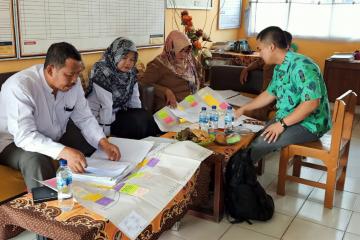
Patrya Pratama, J-PAL ’15, leverages his policy experience to build an education nonprofit
